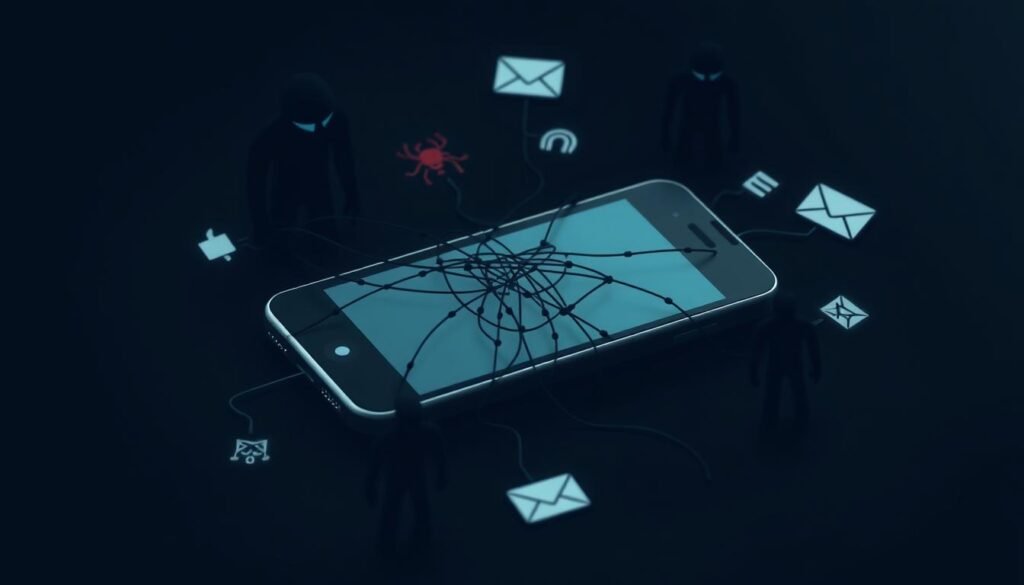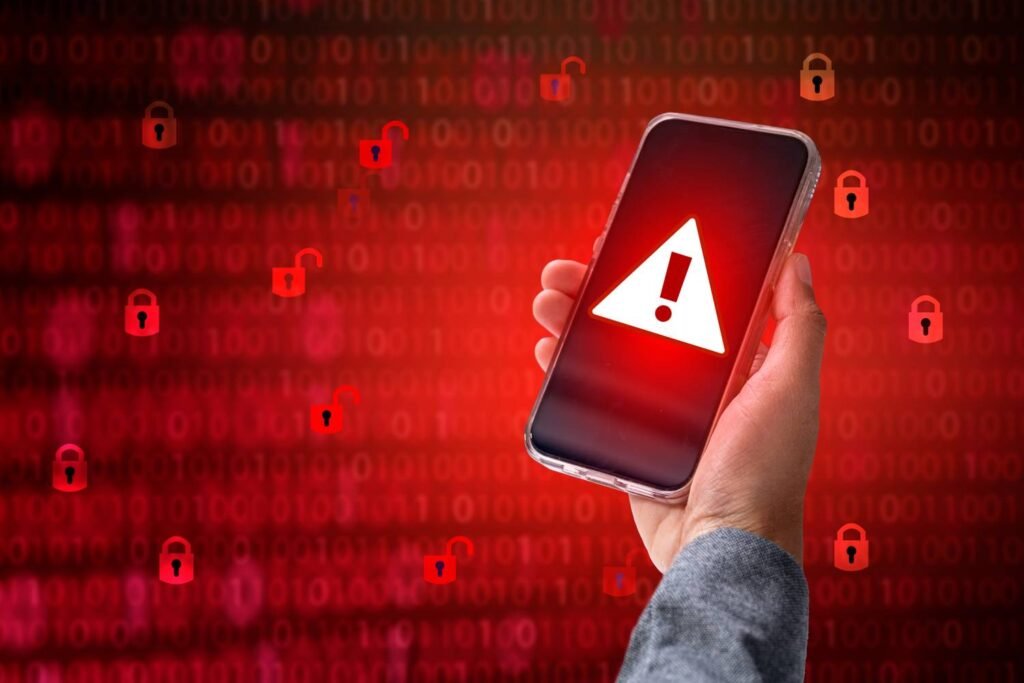Did you know nearly half of all internet users use smartphones for everything? This shows how important it is to safeguard your phone from spyware. Smartphones are a big target for hackers. Millions of phones are already infected with spyware, making security even more crucial12.
Spyware is very dangerous. It can sneak onto your phone without you even knowing. This makes it urgent to find ways to protect your smartphone from spyware13. It can steal your private info, like what you type and your messages. It can even record your voice and video, taking away your privacy1.
As you keep reading, you'll learn key tips to keep your phone safe from these threats.
Key Takeaways
- • Almost 50% of netizens use smartphones for all personal activities.
- • Many users neglect security solutions, exposing themselves to spyware threats.
- • Spyware can stealthily collect sensitive data without user consent.
- • Regular software updates are crucial to preventing spyware infections.
- • Misinformed app downloads often lead to spyware infiltration.
- • Recognizing signs of spyware can bring immediate action to protect your phone.
Understanding Spyware: A Threat to Your Privacy
Spyware is a big threat to your privacy, stealing your personal info without asking. You might ask, What is spyware? It secretly collects data from your device, like login info, what you type, and private chats. Spyware has become a big problem since 1995, especially in the early 2000s with threats like adware, keyloggers, and Trojans4.
Spyware works in the background, often hidden from users. It can change system settings, take pictures, and record audio and video. Spyware authors often trick people by dressing up their malware as real apps, creating big security risks5.
Today's devices are at risk because of their connection to the internet. Phishing emails and attachments are common ways spyware gets in, often hidden in free software from shady places. It's important to protect your phone from spyware, as it can harm any operating system, like Windows, Android, or iOS4. Knowing how spyware works helps keep your personal info and privacy safe.
How Phones Get Infected with Spyware
It's important to know how phones get spyware to keep your info safe. Spyware usually gets in through bad app downloads and physical access. It can also come from apps already on your phone.
Malicious Apps and Downloads
Bad app downloads are a big way spyware gets in. Hackers make fake apps that look real. This makes it hard to tell the good from the bad.
Getting apps from unknown places raises your risk a lot. This can lead to identity theft and slow down your phone6. Always get apps from places like Google Play or the App Store7. Also, be careful with what permissions you give apps during setup7.
Physical Access and Pre-Installed Apps
Someone can install spyware on your phone if they have it. This is a big privacy risk. Also, some phones come with spyware already installed, which is often not noticed6.
Locking your phone with a strong passcode is key. It keeps your data safe from unauthorized access7.

| Method of Infection | Description | Prevention Tips |
|---|---|---|
| Malicious Apps | Downloading apps that may contain spyware. | Use official app stores, check reviews, and read permissions carefully. |
| Physical Access | Someone installs spyware directly onto your device. | Keep your phone secured with a lock screen and avoid lending it out. |
| Pre-Installed Spyware | Spyware included during manufacturing without user knowledge. | Research device specifications before purchase tools for malware detection. |
Knowing how phones get spyware helps you protect your info. Use reliable security tools to stay safe7.
Signs Your Smartphone May Be Infected
It's important to know the signs of spyware on smartphones to keep your device and info safe. If you think your phone is hacked, look for indicators of spyware presence. Users often see sudden data use increases, trouble logging in, or apps crashing.
Also, watch for odd changes like password changes or strange transactions. These are clear indicators of spyware presence. Quick action can stop more problems.
Indicators of Spyware Presence
Here are common indicators of spyware presence:
- • Random pop-up ads and messages.
- • Excessive battery drain.
- • Slow device response time.
- • Frustrating temperature increases leading to device overheating.
Watching for these signs can help you spot malware on your phone8. For example, getting random messages or unexpected charges might mean spyware is at work9. Being alert can help avoid malware risks.
Unusual Data Usage and Performance Issues
Infected phones often show smartphone performance issues. Look out for fast battery drain, slow performance, and apps crashing. Unusual data use might mean spyware is talking to servers.
For more info, check out this resource on spotting these problems early. Knowing these signs helps you fix issues before they get worse10.
How to Protect Your Smartphone from Spyware
Being proactive is key when you want to protect your smartphone from spyware. By following some essential practices, you can enhance your mobile security significantly.
Updating Your Operating System Regularly
Updating your smartphone’s operating system regularly is crucial for security. System updates often contain important patches for vulnerabilities that cybercriminals might exploit. Keeping your apps updated serves a dual purpose, ensuring you enjoy the latest features and benefit from the latest security enhancements. Regular updates can help mitigate the risks posed by malicious apps, identified as a significant source of mobile spyware today2.
Avoiding Third-Party App Stores
Sticking to reputable app stores like Google Play or the Apple App Store is vital. Third-party app stores frequently lack stringent security checks and can expose you to malicious apps. Google Play reportedly deletes hundreds of thousands of malicious apps annually, which helps maintain a safer environment for users2. By avoiding these less regulated platforms, you minimize the chances of downloading harmful software.
Reviewing App Permissions and Finding Trusted Apps
Regularly reviewing app permissions ensures that you are aware of what data and features each app accesses. Apps that request excessive permissions may signal malicious intent. Focus on downloading applications that are recommended by trusted sources and take the time to conduct research before installing them. With evidence suggesting that routine system updates and reviewing permissions effectively reduce vulnerabilities to spyware attacks, you can enhance your device's security2. Following these practices can ultimately foster a safer digital experience.
Best Practices for Smartphone Spyware Protection
To keep your smartphone safe, it's key to know the best ways to protect it from spyware. By following these tips, you can keep your device and personal info secure.
Locking Your Phone and Keeping It Secure
Start by setting a strong passcode or using biometric locks like fingerprint or facial recognition. This makes it hard for others to get into your phone.
- • Make sure your phone locks itself after a few minutes, like 511.
- • Always keep your phone in your hands11.
- • Don't talk about private stuff when your phone is not locked11.
Installing Comprehensive Mobile Security Software
With more spyware around, getting good mobile security software is crucial. This software checks downloads for viruses and spyware and keeps up with new threats12.
- • Pick a mobile security app that's known for being effective, like Kaspersky Internet Security12.
- • Free apps might not protect as well as paid ones, so think about getting a paid version for better security12.
- • Good software can guard not just your phone but also tablets and computers at the same time12.

Safeguarding Your Phone from Spyware: Key Strategies
In today's world, keeping your phone safe from spyware is key. With 81% of people using their phones for both work and personal stuff, it's important to know the risks13. By using smart security steps, you can lower the chance of threats.
Reviewing Application Activities and Permissions
Checking your apps regularly is a smart move. Each app should only get the access it really needs. Watch out for apps that ask for too much info. It's best to stick to official stores and trusted apps14.
Maintaining Vigilance in Online Behavior
Your online actions are crucial for phone safety. Don't click on weird links in emails or texts. Spyware can steal your personal info, like your browsing history and passwords14. By being careful online, you keep your phone and work safe.
Spyware Removal for Smartphones: What You Need to Know
If you think your smartphone has spyware, knowing how to remove it is key. Spotting spyware early can protect your personal info. Using the right tools is a big part of this process.
Identifying and Using Effective Spyware Removal Tools
Choosing the right spyware removal tools for your smartphone is vital. Apps come from many places, so using trusted software is crucial. In 2019, Avast found eight spy apps on Google Play Store that were downloaded 140,000 times before being taken down15.
These tools need to update often to catch new threats. For Android users, Avast One is a top choice for finding and removing malware.
Steps to Take After Identifying Spyware
After finding spyware, like slow speeds or battery issues, act fast. First, cut your device off from the internet to stop more damage. Update your Android OS and use your spyware removal tools.
If needed, a factory reset can wipe out spyware but remember to back up your data first15. For more tips, check out this site for keeping your device safe.
| Spyware Detection Signs | Recommended Action |
|---|---|
| Slow speed and battery drain | Run a malware scan and consider resetting your device. |
| New apps or unfamiliar settings | Inspect installed apps and remove any unknown software. |
| Unsolicited ads and pop-ups | Install a reputable ad blocker and scan for malware. |
| Strange text messages or noises during calls | Check your phone for any unauthorized access and change your passwords. |
Importance of Data Backup for Smartphone Security
Backing up your smartphone data regularly is key to keeping your important info safe. This is especially true when facing malware or losing your device. Studies show that up to 40% of cell phones are at risk of cyber-attacks. This shows how vital data backup is for your phone's security16.
Using cloud services or saving to a computer offers a safe place for your files. This step not only stops data loss but also makes it easy to get back your files if something goes wrong. With free public Wi-Fi, the risk of malware grows, making backups even more crucial17.
Having a regular backup routine helps a lot when dealing with bad incidents. It's also important to keep your phone's software and apps up to date. This helps fix security issues that could leak your personal info. Choosing wisely when downloading apps can also help avoid thousands of fake apps that are dangerous17.
Conclusion
Protecting your smartphone from spyware is crucial for your security. Knowing how spyware works and its dangers helps you protect your device. Regular updates and checking app permissions are key steps to keep your phone safe.
Using trusted security software and staying updated on privacy also helps. Hackers often target smartphones, so it's important to be careful with apps and links18.
Being proactive and using smart strategies keeps your info safe and your privacy secure. For more tips on protecting your device, check out resources that explain how to stay safe online here.




